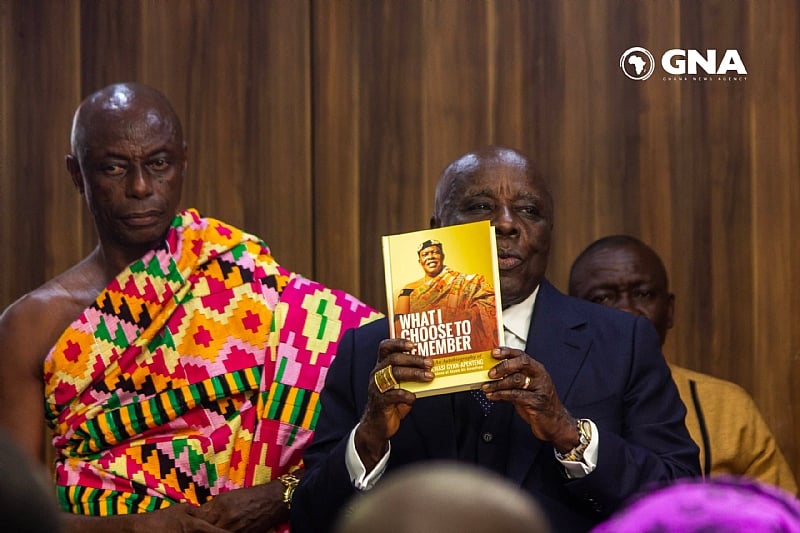Nana Kwasi Gyan-Apenteng, the Apagyahene of Akyem Ati Amanfrom, left a final gift to the world before his passing: the completed manuscript of his autobiography, “What I Choose to Remember.” This posthumously published work serves as both a testament to his accomplished life and a poignant reminder of his enduring legacy as a journalist, author, and chief. The book launch, held at the GNAT Hall, was a bittersweet occasion, blending celebration of his literary achievement with the somber reality of his absence. The Okyehene, Osagyefo Amoatia Ofori Panin, who also served as Nana Gyan-Apenteng’s overlord, presided over the launch, honoring a man he described as deeply committed to the welfare of humanity. The book itself is a 22-chapter journey through Nana Gyan-Apenteng’s life, told with his characteristic humor and storytelling prowess. It promises an intimate look into his formative years, his professional endeavors, and the experiences that shaped his worldview.
“What I Choose to Remember” traces the evolution of Nana Gyan-Apenteng’s progressive ideals, from his childhood challenges to the status quo to his later advocacy for social justice. The book reveals a man driven by a strong moral compass, a man who used his voice and his pen to fight for a better society. It offers a chronological account of his life, exploring how his upbringing and various experiences influenced his leftist leanings and fueled his passion for student activism, journalism, and political advocacy. The narrative provides a personal perspective on key historical events, offering valuable primary source material for students and scholars alike. The book’s exploration of Nana Gyan-Apenteng’s life promises insights into the social and political landscape of his time while also revealing the personal philosophies that guided his actions.
Osagyefo Amoatia Ofori Panin, in his tribute, recalled insightful conversations with Nana Gyan-Apenteng on national issues, particularly their shared belief in decentralization as a crucial development tool. They both advocated for empowering local communities with control over their resources. The Okyehene’s words echoed the sentiment that Nana Gyan-Apenteng’s legacy was one of service and a deep desire for a better Ghana. This sentiment was further reinforced by Nana K.A. Busia, an Associate Professor and Research Fellow at the University of London, who reviewed the book. He highlighted Nana Gyan-Apenteng’s lifelong pursuit of social justice, evident from his early defiance of perceived class systems to his later use of media as a platform for social change. The book, he suggested, is essential reading for anyone interested in politics, sociology, and international affairs.
Ambassador Kabral Blay-Amihere, former Chairman of the National Media Commission (NMC), shed light on Nana Gyan-Apenteng’s vision for media reform in Ghana. He outlined proposals for restructuring the NMC, notably reducing the number of commissioners and transitioning to full-time roles for enhanced effectiveness. These proposals, a testament to Nana Gyan-Apenteng’s forward-thinking approach, underscore his commitment to a robust and responsible media landscape. His advocacy for constitutional reforms within the NMC reflects his belief in the media’s crucial role in a democratic society and his desire to strengthen its independence and effectiveness.
Dr. Nana Charles Sifa Twum, Acting Board Chair of the Ghana News Agency, praised Nana Gyan-Apenteng’s courage in speaking truth to power, fearlessly addressing societal ills. He urged others in the media to continue his legacy of outspoken advocacy and to use their platforms to challenge injustice. This call to action emphasizes the importance of carrying forward Nana Gyan-Apenteng’s fight for a better Ghana, a fight characterized by fearless journalism and a commitment to holding those in power accountable.
Nana Gyan-Apenteng’s life was a tapestry woven with threads of intellectual curiosity, social activism, and unwavering commitment to his principles. From his early days challenging societal norms to his later years advocating for media reform, he consistently championed a more just and equitable world. His autobiography, “What I Choose to Remember,” stands as a final testament to this enduring legacy, a gift to future generations seeking to understand the man behind the words and the values he held dear. The book launch, while tinged with sadness, served as a powerful celebration of his life and a call to action for those who share his vision of a better Ghana. His burial, scheduled for October 4th, 2025, at Tafo Ati in the Eastern Region, will mark the final chapter of a life well-lived, but his legacy, preserved in the pages of his autobiography, will continue to inspire and inform for years to come.














